Knowing the right buzzwords can help you prove to clients that you know what you’re talking about. Yet, not all buzzwords are created equal, and some may even paint you in a bad light.

In my experience as a marketing consultant, good buzzwords are widely understood, not cliche, and propel the conversation forward. After “consulting” some of the best consultants in the industry, I’ve created a list of which buzzwords/phrases can make you look like an expert and which ones you should avoid. If you’re an aspiring consultant, check out these terms to be in the know.
Table of Contents
15 Consulting Buzzwords and Phrases You Need to Know
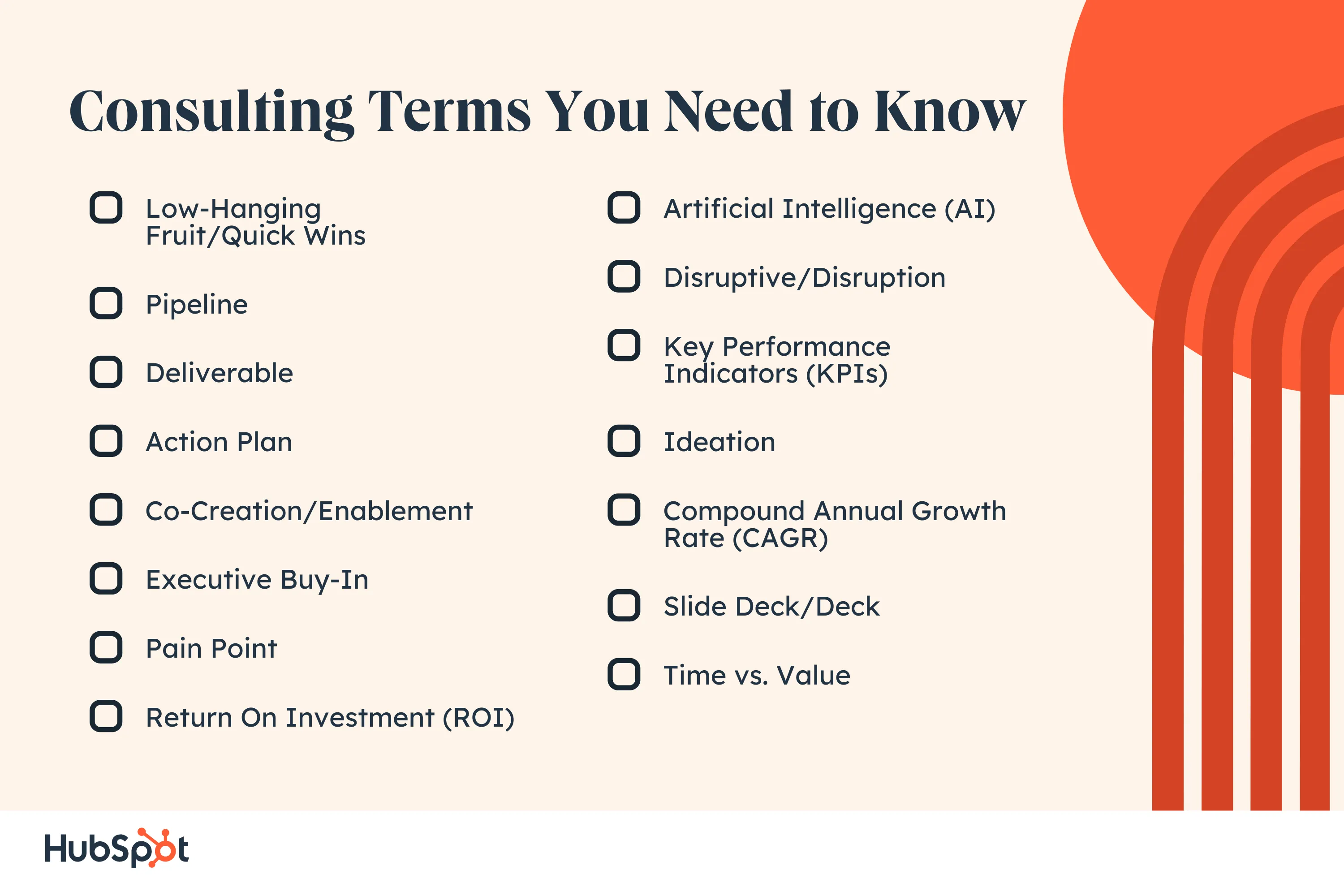
1. “Low-Hanging Fruit” or “Quick Wins”
In conversations about improving my client’s marketing strategies, the terms “low-hanging fruit” or “quick wins” inevitably come up. These terms mean easy fixes a client can make that will make a big difference.
These terms don’t only apply to marketing. Think about a traditional business consultant who comes into an organization to identify which things are working and which aren’t. Some issues might require a lot of money and effort (e.g., fire your sales team and rehire better ones), while others need only a quick solution (e.g., have sales staff include a scheduler link in their signature).
2. “Pipeline”

In consulting, a pipeline refers to upcoming projects that a team or a business has coming up. For example, a product team plans to launch a new product in their pipeline over the next six months. When talking to clients, use the term pipeline as a general phrase to refer to everything they have on their plate within a specific amount of time (three months, six months, a year, etc.).
3. “Deliverable”
A deliverable is any physical or online piece of content, spreadsheet, document, legal brief, etc. that a team needs to complete a project. For example, a project is coming down the “pipeline” and still needs quite a few “deliverables” before assignments can be made.
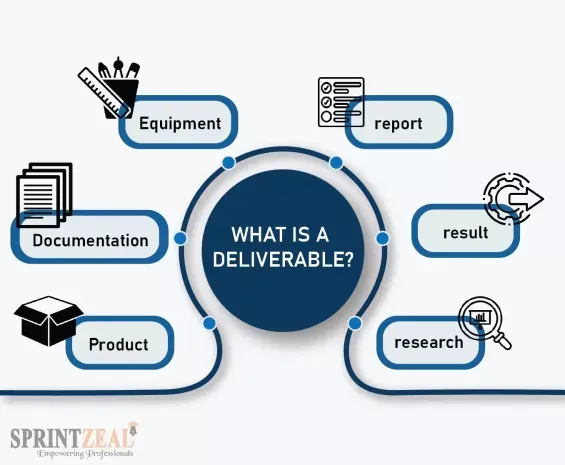
In my experience, it’s easy to get bogged down in conversations with clients when you start identifying every single part of a project that must be completed. Remember, as a consultant, you’re there to help them see the big picture and address the finer details.
Using a term like “deliverable(s)” can help the conversation keep moving by not getting too into the nitty-gritty of what each deliverable actually is.
4. “Action Plan”
An action plan includes any set deadlines, items that need to be completed, resources, and assigning who is responsible for each task/implementation. Your action plan should be both time-sensitive and specific so you can measure success.
When talking to clients, I often use the phrase “action plan” to bring back focus if we get off topic or are speaking too hypothetically and not enough about specific plans.
5. “Co-Creation” or “Enablement”
Co-creation or enablement refers to when clients and consultants work together to identify problems and solutions. While a consultant can come in blind and try to find any problems and solutions, everyone is going to be more successful if there is team enablement that leads to the co-creation of an action plan.
Joseph Whiting, a solutions consultant for Lucid software, says he likes these two buzzwords because “we don’t wanna just sit back and wait for your solution; we wanna see you diagnose and build it. I’m loving the engagement of clients who want to be part of the process instead of just sitting back and waiting for our recommendations.”
6. “Executive Buy-In”
When deciding on budgets, hiring, or any major change, you often need “executive buy-in,” which essentially means making sure the company's higher-ups are on board with the decision.
I think the phrase “executive buy-in” is useful in consulting conversations because you almost always need executives to sign off on the changes you plan to make at a company. In fact, if most of your proposed changes for a company are small enough that they don’t need executive buy-in, there’s a good chance you’re thinking too small.
7. “Pain Point”
The buzzword “pain point” refers to a recurring or persistent problem that inconveniences and makes clients’ lives harder. As a consultant, your primary job will be addressing customer pain points. Whether you actually use the phrase in conversation or just work on addressing your client’s concerns, it’s still a critical buzzword to know about.
8. “Return On Investment” (ROI)
No matter which type of consulting you perform, your clients will expect you to understand the term ROI. The term “return on investment” can be used as precisely as an actual revenue number clients hope to reach in a specific amount of time or as broadly as a general term for a good investment. You can even calculate an exact ROI using free Excel templates and formulas.
9. “Artificial Intelligence” (AI)
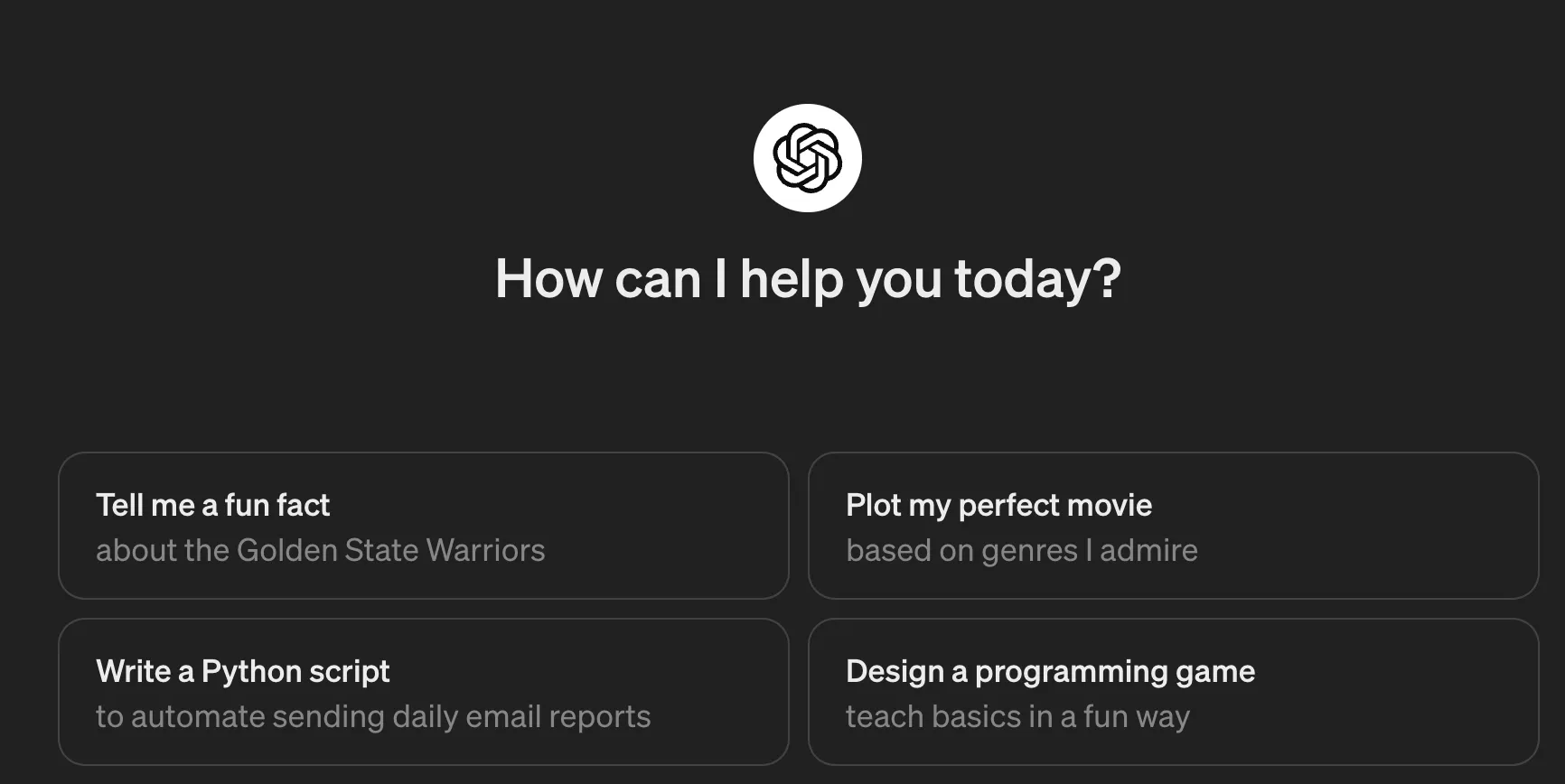
Ok, so artificial intelligence is more than just a buzzword — it’s a computer feature that simulates human intelligence and problem-solving capabilities. But AI is a hot topic, so it’s an important phrase to address in your consulting meetings. Subscribe to the HubSpot AI blog to get more information on how to incorporate AI into your consulting pitches.
10. “Disruptive” or “Disruption”
“Disruptive” consulting works to identify and capitalize on opportunities in the marketplace. It’s an easy label for decisions that pose a risk but could potentially bring a lot of rewards.
Adam Nielson describes this as “fixing, refining, maintaining, and mending are fantastic actions, and there’s no need to label them as disruption — or worse — avoid any action because it isn’t cool like disruption.”
Nielson notes that if he uses the word disruption, there’s likely a huge risk involved.
“We are going into the unknown, and as much as I hope to change the relationship status on this venture from ‘disruptive’ to ‘massive and unequivocal success,’ I have to (9 times out of 10) be ready to mark it as a ‘dead-end.’ If I can’t do that, I know it wasn’t a disruption after all,” Nielson says.
11. “Key Performance Indicators” (KPIs)
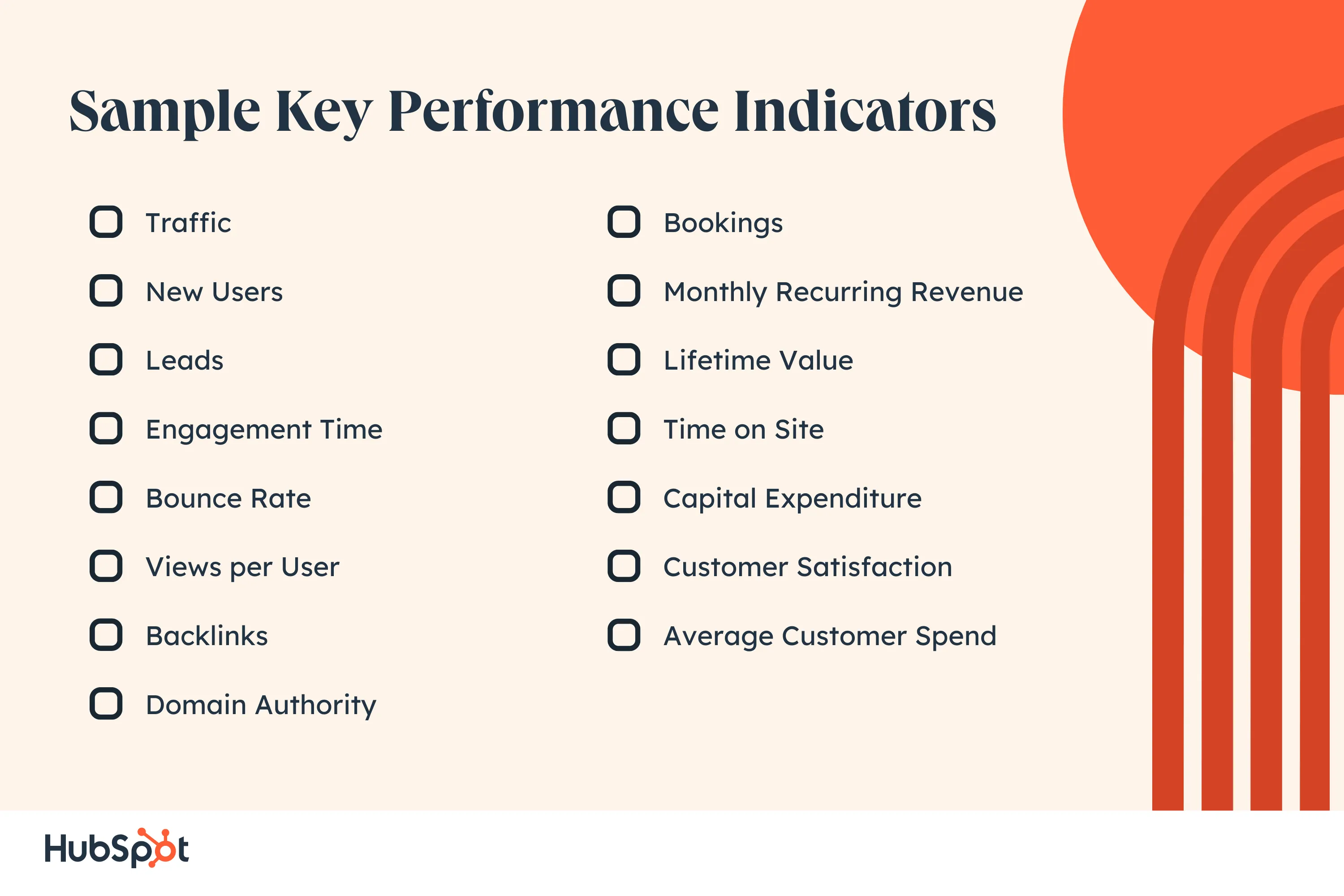
KPI is an acronym for key performance indicators, which measure performance and progress toward a specific goal over time. You can measure almost infinite KPIs, so your job as a consultant is to establish which ones are most important to your clients and how they would like to measure them. Check out this blog on choosing KPIs for your customers.
12. “Ideation”
Ideation refers to the ideation phase or brainstorming, where you create theoretical ideas to solve problems. I think this is an important phrase for consultants to know because it’s still used frequently in office culture and it’s an important part of the consulting process.
13. “Compound Annual Growth Rate” (CAGR)
CAGR is the rate of return a company uses to describe the growth of its investment over the course of a year. This is an important phrase for all consultants to know when discussing a company’s financial state. Get familiar with CAGR by checking out this blog on how to calculate your compound annual growth rate in Excel.
14. “Slide Deck” or “Deck”
A slide deck is essentially just a PowerPoint presentation or slide show that describes what you can do for a company as a consultant. Remember, a good slide deck should describe:
- What you do as a consultant.
- The problem that the company faces (show you understand).
- Proposed solutions.
- Your credentials/expertise.
- What the next steps are.
Make sure to cover all these details in your slide deck so your clients know your process.
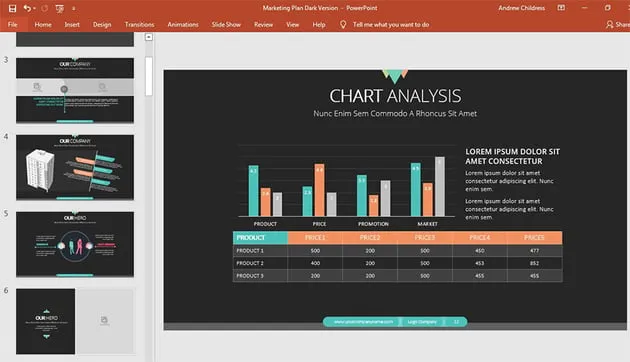
15. “Time vs. Value”
Time is an obvious constraint — you will have to bill clients for the hours you work, and that won’t change. However, you can always work on offering more value for the time you work.
I think this phrase is a great one to bring up in hiring conversations when you initially talk with clients. Having a good understanding of what value you bring to the table can go a long way in being chosen as a consultant.
“Clients appreciate it when you understand their needs and go above and beyond to provide outstanding value. This builds trust and loyalty and allows you to command premium pricing. The key is quantifying that value through metrics that resonate,” says Consultant Raja Narayana.
.png)
8 Free Consulting Templates
Access 8 templates for consultants in The Complete Consultant's Success Kit.
- Management Consulting Plan Template
- Business Plan Template
- Sales Plan Template
- And More!
Download Free
All fields are required.
.png)
15 Consulting Buzzwords and Phrases to Avoid
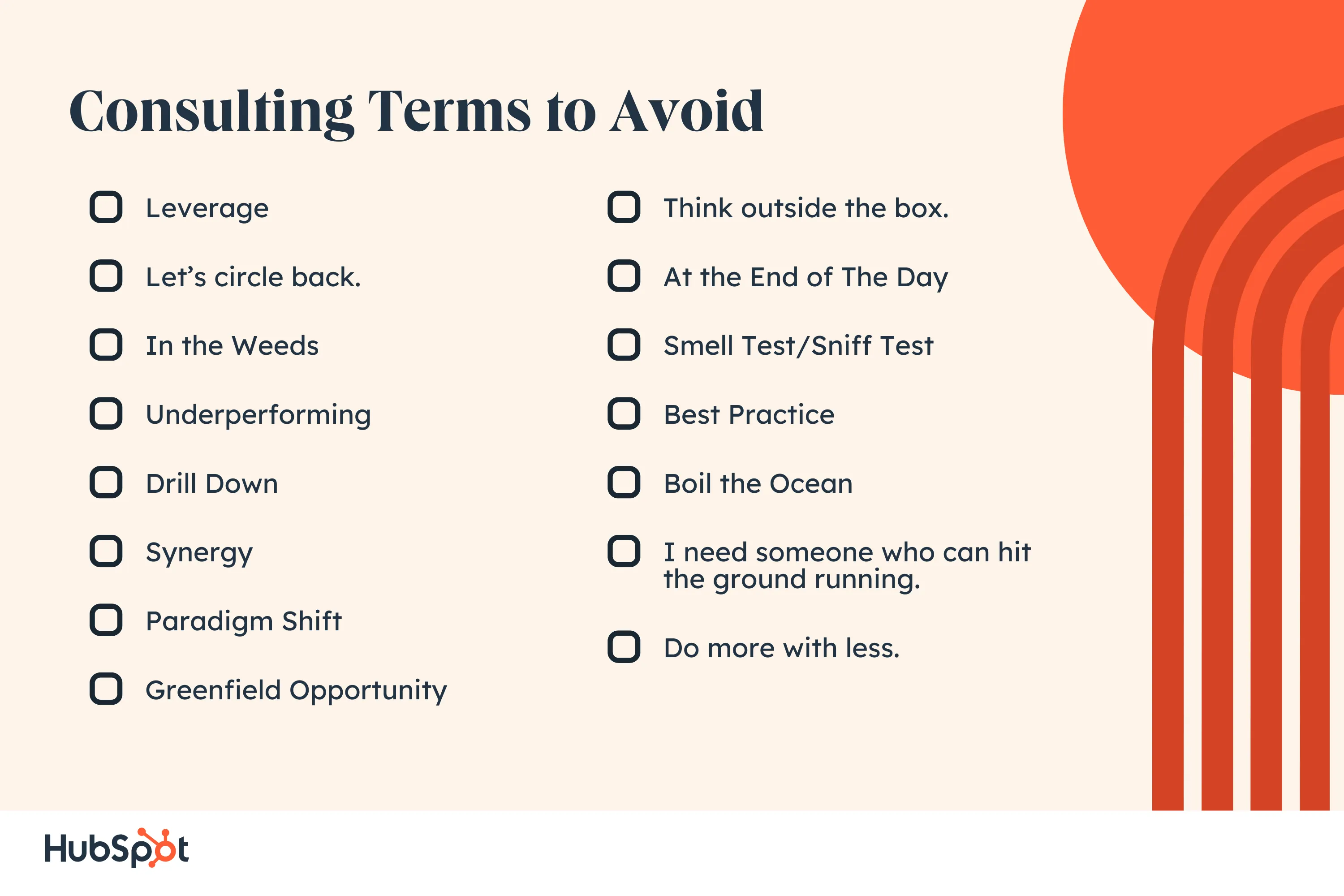
Some buzzwords can make you seem like you’re trying too hard to be an expert without saying something of real value.
Noel Diggs, a digital marketing consultant who has worked with brands such as Converse, DoorDash, and TripAdvisor, explains that sometimes buzzwords can become “ubiquitous in the day-to-day.”
While overused buzzwords do “have a function and purpose,” he believes some buzzwords have “become oversaturated in a business context and are starting to lose their value. Before, these used to be words to call your attention to impactful insights, meaningful actions, or future initiatives. Now, these have almost become more commonplace and lost a bit of their value.”
1. “Leverage”
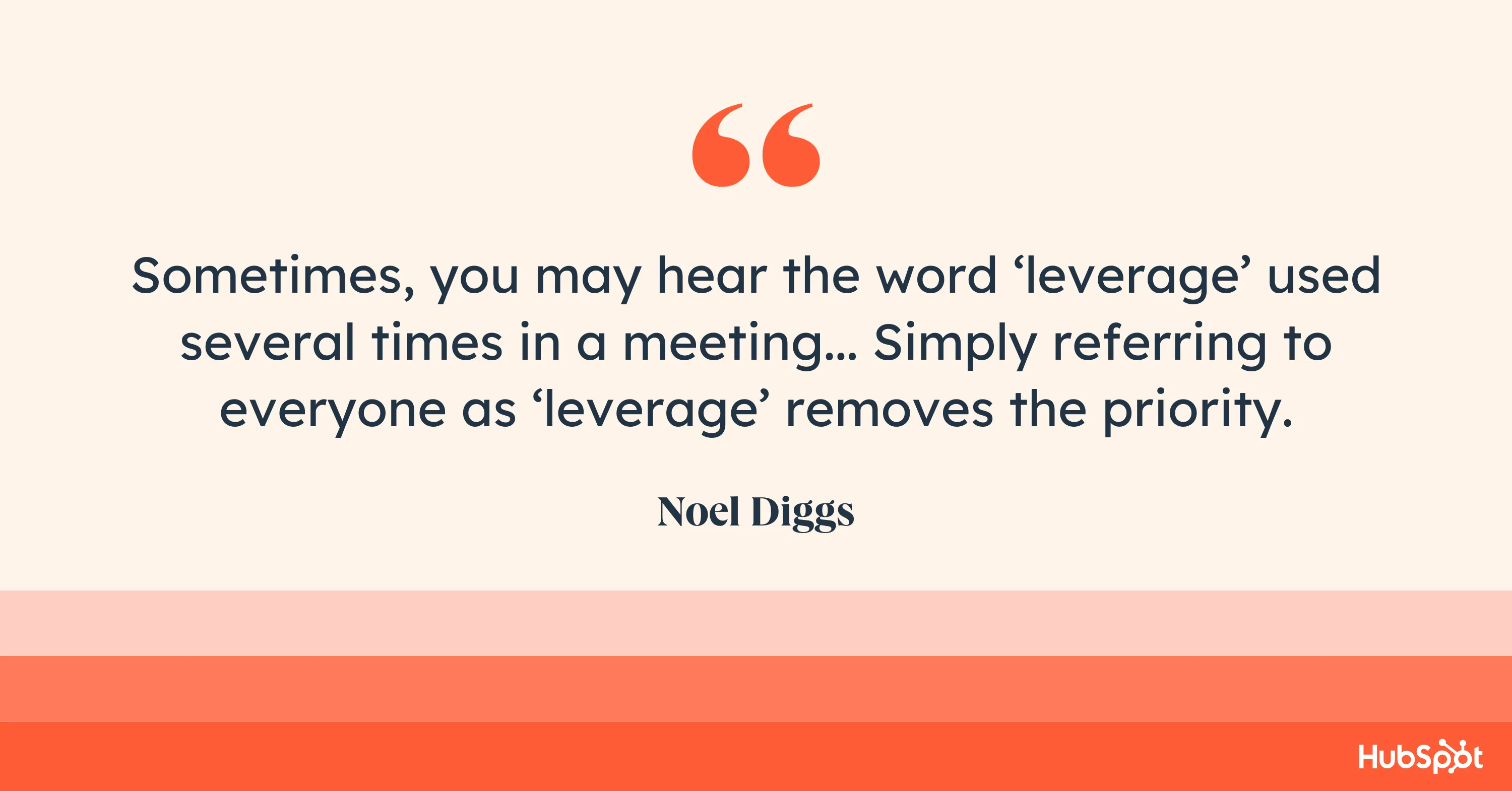
The definition of leverage is the balance of the cost to deliver a project versus the projected revenue gained. You’ve probably heard this word a lot in consulting conversations, and it’s becoming overused.
“Sometimes, you may hear the word ‘leverage’ used several times in a meeting; it’s understandable that one insight may lead to another or the potential for action, but simply referring to everyone as ‘leverage’ removes the priority. Which initiatives should be structured first? Which have the most potential?”Noel Diggs says.
2. “Let’s circle back.”
“Let’s circle back” is often heard during a meeting when someone wants to change the topic or doesn’t want to address an issue right then.
Joseph Whiting is a consultant who has worked in fintech, non-profits, government, and tech startups as an innovation and design thinking coach.
Whiting says this phrase is often “used by people who don’t like the direction of the discussion and, instead of addressing their concerns, they punt the important discussion to another meeting with the hopes that they can either kill the topic or sway the group beforehand. This is not a productive route.”
3. “In the Weeds”
The phrase “in the weeds” refers to being so involved or tangled up in small details that you’re unable to see the big picture.
My real issue with the phrase “in the weeds” is that it undervalues how important it is to dig deep into a project’s details. I believe that at least one team member should be “in the weeds” at one time, and if a conversation gets too “in the weeds,” it doesn’t mean that it isn’t worth talking about.
4. “Underperforming”
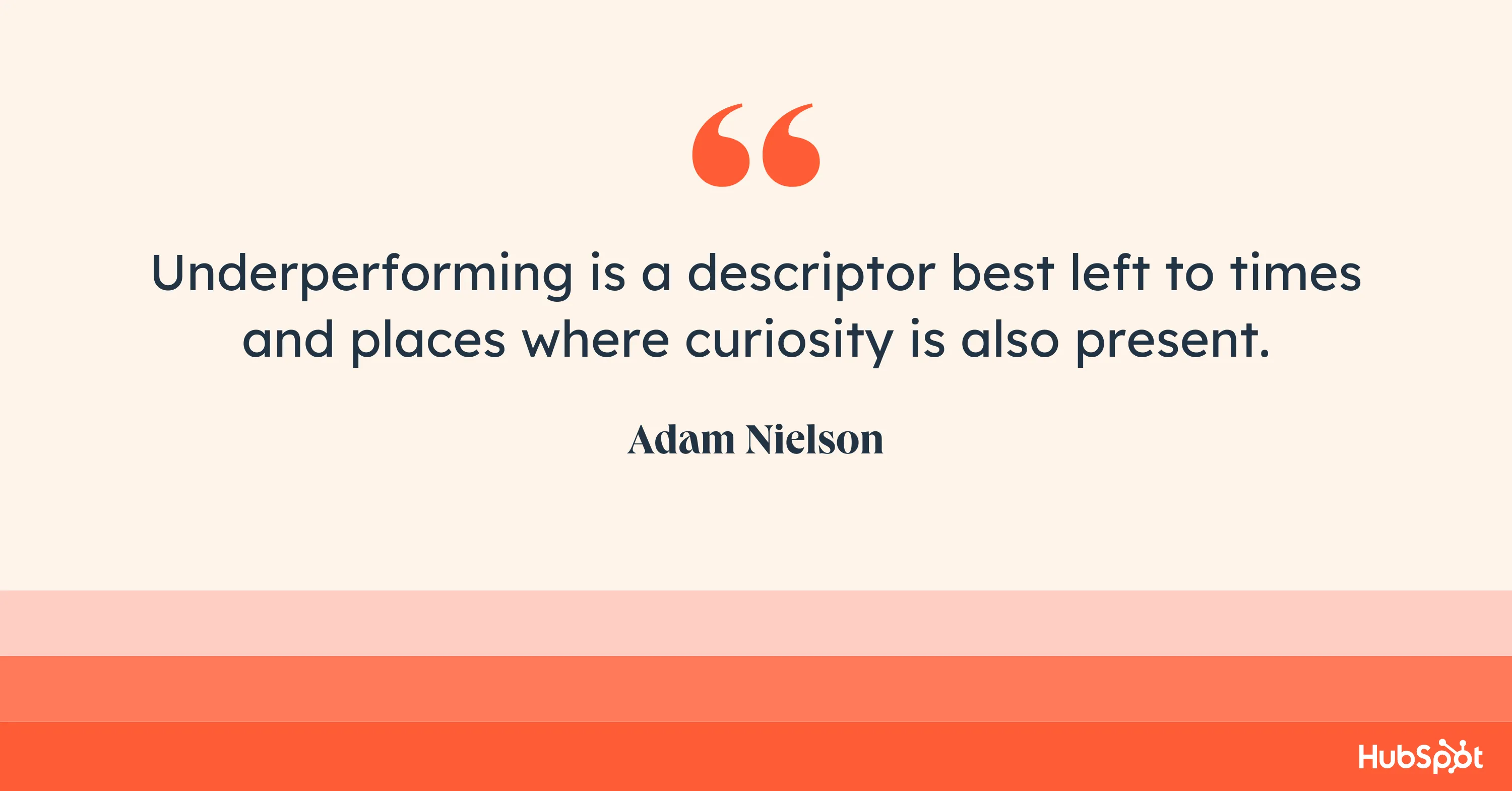
Underperforming is a consulting phrase that means you’re not meeting the required expectations. The phrase applies to staff, programs, projects, products, etc. I think the term underperforming is too severe.
Adam Nielson is a consultant who has worked with Adobe, Amazon, Ancestry, and Cloudinary. He says that the phrase underperforming “ends up siloing people and treating systems like they are geared like a Swiss watch when they are much more organic and fantastic.”
Nielson compares this idea to the human body.
He explains, “If I were to separate tendons (so wonderful and flexible) from bones (they take up so much space!) and muscle (my gosh, these things are always asking for more protein!) — I would be a fool.”
Beyond that, he says, people need to look at the bigger picture.
“I would also be a fool to ignore that I’ve been running everything on steroids, Cliffbars, and halftime speeches rather than taking the time for muscles to repair, bones to build bonds, and ligaments to stretch,” he expands. “Underperforming is a descriptor best left to times and places where curiosity is also present.”
5. “Drill Down”
Similar to “in the weeds,” “drill down” refers to getting a more specific view of data in a program like Excel. In consulting, it means getting more specific on a certain subject. I don’t think consultants should use the term “drill down” because it’s been used so much in corporate jargon that it’s both cliche and easier to just say what you mean.
6. “Synergy”
The definition of synergy is when two parties come together to work on a project and produce a greater result than they could have on their own. If you’re still using the word synergy in 2024, the nineties just called and want their word back. But really, synergy wasn’t a useful word when it was popular three decades ago, and it’s aged even worse.
7. “Paradigm Shift”
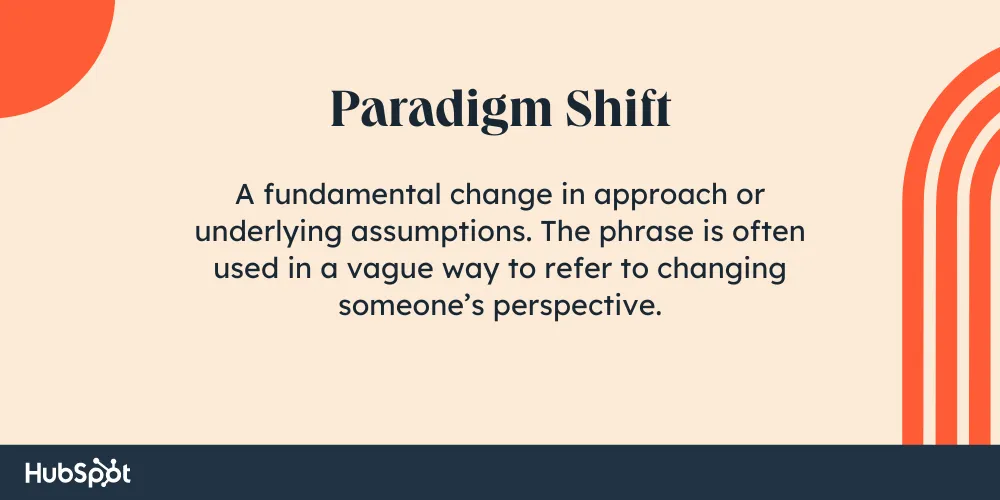
A paradigm shift is a fundamental change in approach or underlying assumptions. I’ve heard this phrase only a couple of times in consulting conversations, probably for the same reason I don’t like the phrase. In my opinion, the phrase is almost always used in a vague way to refer to changing someone’s perspective.
To me, it feels like saying “we need a paradigm shift” sounds intelligent but isn’t really creating a concrete plan or moving the conversation forward. In fact, it can be used in a way that stops conversation because people can then be afraid to share their opinions because they’re worried about not thinking differently enough.
8. “Greenfield Opportunity”
A greenfield opportunity is a venture that offers an exciting opportunity for a company. I’ve heard consultants use this phrase when they think an opportunity can be exciting and rewarding for a company, but I think it’s a little too specific to our industry for clients to easily pick up on what you’re saying.
Until this phrase becomes more widely used, I’d keep it out of conversations.
9. “Think outside the box.”
Similar to the phrase “paradigm shift,” the phrase “think outside the box” means to think about something with a different, unique, or new perspective. The problem with this phrase is it’s unclear how to successfully accomplish thinking outside the box.
It’s also been so overused that it’s become cliche and trite. If you want to encourage your clients to think differently, give them brainstorming exercises that actually get the ideas flowing, not a meaningless command.
10. “At the End of The Day”
The phrase “at the end of the day” can be used interchangeably with “ultimately” or “finally.” Have you noticed a lot of these buzzwords you shouldn’t use can halt a conversation? Using this phrase can make your client feel like you aren’t listening to them or you believe you have the final say on a decision.
Instead, give your expert opinion and open it up for discussion. You might be surprised by what feedback you receive.
11. “Smell Test” or “Sniff Test”
A smell test is when a certain decision or understanding is being challenged, similar to smelling food or drink to see if it’s gone bad. I really dislike this phrase because it’s both an oddly gross metaphor and not used enough for it to be clear what you’re saying.
Instead of saying “smell test,” I’d explain why I’m not on board with a certain take.
12. “Best Practice”
“Best practice” refers to what is considered the best solution in whichever industry you are speaking about.
I don’t think this phrase is inherently bad; I’ve just heard it used in a way that touts authority with little to back it up. If you’re going to tell a client that a certain direction is considered best practice, you need to have data and real-life experiences to back that claim up.
Not only will this make your suggestion more compelling, but the client can discern if they think this will apply to their situation.
13. “Boil the Ocean”
You might have heard this phrase used when someone thinks a task is impossible or too much work. They might say something like “Let’s not boil the ocean,” meaning, let’s not take on too much work. This phrase makes its way onto the avoid list for being too vague and a conversation stopper.
If you or your client think a task is too hard, identify what makes it too hard or what could be done to simplify it. Simplifying difficult tasks is an important skill for any consultant, so take this opportunity to challenge yourself instead of dismissing it altogether.
14. “I need someone who can hit the ground running.”
This phrase is likely to strike fear into the hearts of anyone who hears it because it basically means that the project is already behind before you even start.
Whether you use this phrase or you have a client who uses it when speaking to you, be sure to set clear expectations of what a reasonable amount of work is. No one should have to burn out quickly on a project just because it wasn’t timed correctly.
15. “Do more with less.”
.webp)
I’ve heard the phrase “do more with less” quite a few times as a marketing consultant, and it essentially means to make resources go further than they normally would. Consultant AdamNielson describes his distaste of the phrase with a metaphor.
“Did you know that macaroni and cheese can last for weeks if it tastes bad to begin with? All you have to do is cut the recommended butter amount by half, water down the dry milk … add the noodles, cook it, then let it coagulate in an old peanut butter container that you set out every lunch,” he says.
Then, he continues, don’t let anyone eat anything else until it's gone. “Well, let me tell you, there is a point when this unending tub of microwaved macaroni and cheese isn’t macaroni and cheese as much as it is gluten strands and dairy proteins,” he notes.
So, when it comes to doing more with less, think of terrible, off-brand mac and cheese that you’ll need to eat for weeks.
“Once doing more with less becomes the standard, things get deeply miserable, and pretty soon, a lot of time goes into convincing people that less really is more,” Nielson says.
Use the Buzzwords That Really Work
Consulting buzzwords and phrases definitely have their time and place. They can save you time if they encapsulate an idea without needing an explanation. I think it’s best to only use buzzwords that are widely known and contribute to the conversation. If you find yourself using a phrase/word that stops conversation or is confusing, be sure to take a step back and make sure everyone can understand.


![How to Write a Consulting Proposal [Templates & Examples]](https://knowledge.hubspot.com/hubfs/ft-consulting.webp)
![Start a Consulting Business in 6 Steps [+Ideas for Your Venture]](https://www.hubspot.com/hubfs/image1-Apr-06-2023-09-15-56-0028-PM.png)





![15+ Interview Questions for Consultants [+ Sample Responses]](https://53.fs1.hubspotusercontent-na1.net/hubfs/53/Consultant%20Interview.png)
